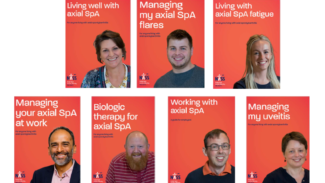
Planning for a family and pregnancy
Read up to date information about planning for a family and pregnancy for people with axial SpA
Read morePractical tips on looking after little ones and older children
This information is for anyone with axial spondyloarthritis, including people with ankylosing spondylitis
It’s important to remember that although you may have to alter things because of your axial SpA, parenting always comes with its ups and downs. We have lots of practical tips to help with looking after little ones while managing your condition.
Although it can be difficult to ask for help, looking ahead and recognising where you may need a helping hand can reduce the pressure.
When you’re looking at buying equipment, such as buggies, car seats and body carriers, try them out in a shop beforehand. When trying them, remember that you’ll have a heavy, wriggly child in it when you’re using it!
Try to find a buggy that is easy to manoeuvre and lightweight – especially if you’ll be lifting it in/out of the car or up/down stairs regularly. It’s also worth practising putting it up and down before baby arrives, so you’re used to it.
Car seats that clip in/out easily and can rotate will reduce the amount of reaching and twisting you have to do. When parking, do make use of the family spaces. The extra space to open doors wide while reaching into the car can really help. Some people find this hack for carrying a car seat invaluable, but it depends on the type of car seat and what’s most comfortable for you.
When out and about, having a crossbody or rucksack as a change bag can be the most comfortable.
Do look into baby chairs and rockers that are comfortable for baby and easy for you to soothe them in, there are lots of types and brands available.
Do speak to your midwife or health visitor about comfortable ways to pick up your baby, particularly from something lower like a Moses basket or cot. Usually it’s recommended to bend your knees to bring yourself lower, then hold baby close to your body as you straighten up.
If you’re buying a baby sling or body carrier, choose one that is easy to put on, with wide cushioned straps that don’t sit directly on areas that tend to be uncomfortable.
You can save energy by having changing stuff in different areas of the home, especially if you have more than one floor. Position yourself at a good height and use something soft if you’re kneeling, for example a cushion or folder blanket.
If you tend to get hand pain or stiffness, buy baby clothes that are easy to fasten. For example, zips or velcro instead of poppers.
When baby is little, you can use a baby bath positioned safely on a table so that you’re not having to kneel or stoop. Once baby is older and using a bath, sit on a chair beside the bath or use a folded towel to kneel on.
Some people recommend sitting in the bath with baby but ensure that you don’t get cold in the shallow water.
When spending time with baby, think about different places that will help you be comfortable. For example, cuddling or playing on the sofa or in bed while using cushions to support you.
When playing on the floor, use a mat or folded blanket to kneel or sit on. You can also buy large, cushioned play mats which are more comfortable and can be sanitised, which is handy when baby starts crawling!
It can be difficult to pace your activity when you’re looking after a new-born. It’s important to rest when you get the chance to and do accept help from friends and family to share the load. Many people are happy to offer help, but specific tasks that can be beneficial are:
Having a supportive community around you is invaluable. Joining baby groups where you meet fellow parents can help with the emotions every parent goes through – they may not have axial SpA, but you will all likely still have lots in common.
If you are experiencing low mood, do reach out to your health visitor or GP. Some people find counselling or therapy very beneficial.
To meet other people with axial SpA, do join your local NASS branch for social events. If you don’t have a local branch, do get in touch as some branches are holding online events. NASS members can also reach out to our active community on the members forum.
As children get older and more active, family life can change a little. There are lots of ways you can keep children entertained while pacing for your energy levels.
Reading, watching TV and cuddling are all restful activities to do with little ones, giving you quality bonding time. Independent play while you’re nearby, such as drawing or playing with toys, can help encourage independence.
Sometimes you can make games out of helping – how quickly can we get the toys into the box? Who can get into their PJs and into bed the fastest? Children often love helping to cook or tidy and it can teach them valuable skills, while providing bonding time.
We know that it can be difficult to strike a balance between being active for your axial SpA and pacing to manage your energy levels. One of the best tips is to do little and often. For example, if going out for a walk, why not walk to a playground where you can rest while the children play before walking home.
Inviting friends and family out with you can reduce the pressure – friends and family may be happy to lift or carry the children when needed.
If you struggle to fit exercise in around family life, see if there’s an online class you can join at a suitable time or a class you can take with the children, such as swimming.
To help explain your axial SpA to friends and family, consider sharing our guide to axial SpA. If people offer to help, then do give them specific things, such as:
We have information about the support available for working with axial SpA and more information on emotional wellbeing.
To meet other people with axial SpA, do join your local NASS branch for social events. If you don’t have a local branch, do get in touch as some branches are holding online events. NASS members can also reach out to our active community on the members forum.

Read up to date information about planning for a family and pregnancy for people with axial SpA
Read more
Read our advice on relationships and intimacy for people with axial SpA
Read more
Download our free guides to help you learn more about managing your axial SpA
Download the guides